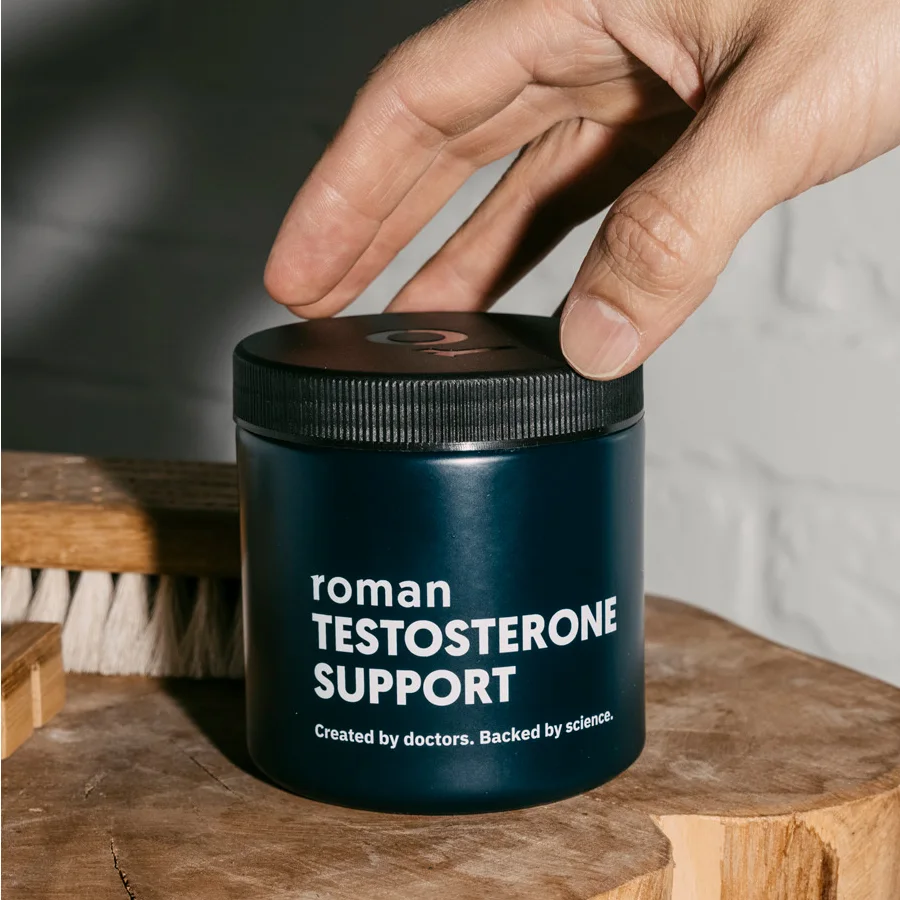Here's what we'll cover
Here's what we'll cover
Here's what we'll cover
Testosterone is an essential sex hormone in both men and women, but present at much higher levels in men. It’s responsible for male features such as facial hair and a deeper voice. It also regulates libido (sex drive), sperm production, red blood cell creation, and mood.
Since testosterone also boosts metabolism, reduces body fat, and increases lean muscle mass, some may wonder: Can supplementing testosterone lead to weight loss?
Does testosterone cause weight loss?
Men with low testosterone levels, also known as “low T” or hypogonadism, can experience various symptoms. They may notice a drop in sex drive, erectile dysfunction, anemia (low red blood cell count), osteoporosis (weak bones), loss of muscle mass, and increased body weight (Nassar, 2022).
In several studies, men with low T who received testosterone replacement therapy (TRT) tended to lose weight and experience reduced body mass index (BMI). Increased lean muscle, reduced waist circumference, and improved blood pressure, cholesterol levels, and glucose metabolism have also been reported in men on TRT compared to those taking a placebo (Saad, 2020; Kaur, 2021).
So, does that mean everyone struggling with weight should start injecting testosterone? Definitely not.
Testosterone isn’t a weight loss treatment, and it’s nowhere near being considered as such. The American College of Physicians says TRT in men with age-related low T can help improve sexual dysfunction and quality of life. The American Urological Association mentions improvements in erectile function, sex drive, anemia, bone mineral density, lean body mass, and depressive symptoms (Diem, 2020; Mulhall, 2018). Nobody recommends testosterone supplementation as a weight loss treatment.
While TRT for low T is generally safe under medical supervision, it’s a medication that shouldn’t be taken lightly. Testosterone products carry a boxed warning that they may increase the risk of cardiovascular disease, including strokes and heart attacks (FDA, 2018). There have been conflicting studies about heart disease risk, and current studies are underway. The potential side effects of testosterone, such as decreased sperm production and high red blood cell count, which can cause blood clots, chest pain, headache, and blurred vision, should also be discussed with a healthcare provider if you’re considering TRT for any reason (Cheetham, 2017; Cervi, 2017).
Can low testosterone cause weight gain?
There is a two-way connection between body fat and testosterone. While normal levels of testosterone stimulate the body to produce lean muscle and skeletal cells rather than fat cells, low testosterone in men is linked to a higher body fat percentage and can make it harder to lose fat. Testosterone deficiency has been linked to both metabolic syndrome and type 2 diabetes in men (Fernandez, 2019; Genchi, 2022).
On the other hand, having excess weight, especially in the form of belly fat, can boost the activity of an enzyme that converts testosterone into estrogen, which in high levels, is linked to obesity in men (Genchi, 2022).
How to boost testosterone if you have low T
If you think you may have low T, it’s best to talk to your healthcare provider. Low T can be confused with other medical conditions like iron deficiency or depression. Testosterone levels are usually checked in the morning when levels are highest. Two low readings (<300 ng/dL) on separate mornings, along with clinical symptoms, are usually required for a diagnosis. Checking both total and free testosterone helps pinpoint problems (Sizar, 2022).
A decrease in testosterone is a natural part of aging and doesn’t require treatment unless it falls under a certain threshold (usually below 300 ng/dL) and causes bothersome symptoms. If you have low T, no longer desire fertility, and have symptoms that bother you, your healthcare provider may discuss TRT. Since TRT negatively impacts male fertility, be sure to tell your healthcare provider if you are still planning to have kids; in that case, they may recommend a medication like Clomid, which can raise testosterone without harming fertility.
There are also a variety of ways to boost testosterone naturally and maintain muscle mass, including:
Working out (especially strength training) (Riachy, 2020)
Getting enough sleep (Liu, 2019)
Reducing stress (cortisol lowers circulating testosterone levels) (Harden, 2016)
Eating a balanced diet (Skoraka, 2020)
Your weight is affected by many factors. If you have questions about weight loss or low T, check with your healthcare provider to explore the causes and treatment options.
DISCLAIMER
If you have any medical questions or concerns, please talk to your healthcare provider. The articles on Health Guide are underpinned by peer-reviewed research and information drawn from medical societies and governmental agencies. However, they are not a substitute for professional medical advice, diagnosis, or treatment.
References
Cervi, A. & Balitsky, A. K. (2017). Testosterone use causing erythrocytosis. Canadian Medical Association Journal , 189 (41), E1286–E1288. doi:10.1503/cmaj.17068. Retrieved from https://www.ncbi.nlm.nih.gov/pmc/articles/PMC5647167/
Cheetham, T. C., An, J. J., Jacobsen, S. J., et al. (2017). Association of testosterone replacement with cardiovascular outcomes among men with androgen deficiency. JAMA Internal Medicine , 177 (4), 491. doi:10.1001/jamainternmed.2016.9546. Retrieved from https://jamanetwork.com/journals/jamainternalmedicine/fullarticle/2604140
Davis, S. R., Baber, R., Panay, N., et al. (2019). Global consensus position statement on the use of testosterone therapy for women. The Journal of Clinical Endocrinology & Metabolism , 104 (10), 4660–4666. doi:10.1210/jc.2019-01603. Retrieved from https://academic.oup.com/jcem/article/104/10/4660/5556103
Diem, S. J., Greer, N. L., MacDonald, R., et al. (2020). Efficacy and safety of testosterone treatment in men: An evidence report for a clinical practice guideline by the American College of Physicians. Annals of Internal Medicine , 172 (2), 105. doi:10.7326/m19-0830. Retrieved from https://www.acpjournals.org/doi/full/10.7326/M19-0830
Fernandez, C. J., Chacko, E. C., & Pappachan, J. M. (2019). Male obesity-related secondary hypogonadism – pathophysiology, clinical implications and management. European Endocrinology , 15 (2), 83. doi:10.17925/ee.2019.15.2.83 https://www.ncbi.nlm.nih.gov/pmc/articles/PMC6785957/
Genchi, V. A., Rossi, E., Lauriola, C., et al. (2022). Adipose tissue dysfunction and obesity-related male hypogonadism. International Journal of Molecular Sciences , 23 (15), 8194. doi:10.3390/ijms23158194. Retrieved from https://www.ncbi.nlm.nih.gov/pmc/articles/PMC9330735/
Harden, K. P., Wrzus, C., Luong, G., et al. (2016). Diurnal coupling between testosterone and cortisol from adolescence to older adulthood. Psychoneuroendocrinology , 73 , 79–90. doi:10.1016/j.psyneuen.2016.07.216. Retrieved from https://www.ncbi.nlm.nih.gov/pmc/articles/PMC5048541/
Kaur, H. & Werstuck, G. H. (2021). The effect of testosterone on cardiovascular disease and cardiovascular risk factors in men: A review of clinical and preclinical data. CJC Open , 3 (10), 1238–1248. doi:10.1016/j.cjco.2021.05.007. Retrieved from https://www.ncbi.nlm.nih.gov/pmc/articles/PMC8636244/
Liu, P. Y. (2019). A clinical perspective of sleep and andrological health: assessment, treatment considerations, and future research. The Journal of Clinical Endocrinology & Metabolism , 104 (10), 4398–4417. doi:10.1210/jc.2019-00683. Retrieved from https://pubmed.ncbi.nlm.nih.gov/31042277/
Lopresti, A. L., Drummond, P. D., & Smith, S. J. (2019). A randomized, double-blind, placebo-controlled, crossover study examining the hormonal and vitality effects of ashwagandha ( withania somnifera ) in aging, overweight males. American Journal of Men's Health , 13 (2), 155798831983598. doi:10.1177/1557988319835985. Retrieved from https://www.ncbi.nlm.nih.gov/pmc/articles/PMC6438434/
Mulhall, J. P., Trost, L. W., Brannigan, R. E., et al. (2018). Evaluation and management of testosterone deficiency: AUA Guideline. Journal of Urology, 200 (2), 423-432. doi:10.1016/j.juro.2018.03.115. Retrieved from https://pubmed.ncbi.nlm.nih.gov/29601923/
Nassar, G. & Leslie, S. (2022). Physiology, testosterone. StatPearls . Retrieved on Sept. 23, 2022 from https://www.ncbi.nlm.nih.gov/books/NBK526128/
Pearce, K. & Tremellen, K. (2019). The effect of macronutrients on reproductive hormones in overweight and obese men: A pilot study. Nutrients , 11 (12), 3059. doi:10.3390/nu11123059. Retrieved from https://www.ncbi.nlm.nih.gov/pmc/articles/PMC6950136/
Rachdaoui, N. & Sarkar, D. K. (2017). Pathophysiology of the effects of alcohol abuse on the endocrine system. Alcohol research: Current Reviews, 38 (2), 255-276. Retrieved from https://www.ncbi.nlm.nih.gov/pmc/articles/PMC5513689/
Riachy, R., McKinney, K., & Tuvdendorj, D. R. (2020). Various factors may modulate the effect of exercise on testosterone levels in men. Journal of Functional Morphology and Kinesiology , 5 (4), 81. doi:10.3390/jfmk5040081. Retrieved from https://www.ncbi.nlm.nih.gov/pmc/articles/PMC7739287/
Saad, F., Doros, G., Haider, K. S., & Haider, A. (2020). Differential effects of 11 years of long-term injectable testosterone undecanoate therapy on anthropometric and metabolic parameters in hypogonadal men with normal weight, overweight and obesity in comparison with untreated controls: Real-world data from a controlled registry study. International Journal of Obesity , 44 (6), 1264–1278. doi:10.1038/s41366-019-0517-7. Retrieved from https://www.ncbi.nlm.nih.gov/pmc/articles/PMC7260126/
Sizar, O. & Schwartz, J. (2022). Hypogonadism. StatPearls. Retrieved on Sept. 23, 2022 from https://www.statpearls.com/articlelibrary/viewarticle/23268/
Skoracka, K., Eder, P., Łykowska-Szuber, L., et al. (2020). Diet and nutritional factors in male (in)fertility—underestimated factors. Journal of Clinical Medicine , 9 (5), 1400. doi:10.3390/jcm9051400. Retrieved from https://www.ncbi.nlm.nih.gov/pmc/articles/PMC7291266/
U.S. Food and Drug Administration (FDA). (2018). FDA cautions about using testosterone products for low testosterone due to aging; requires labeling change to inform of possible increased risk of heart attack and stroke with use. FDA Drug Safety Communication . Retrieved on Sept. 23, 2022 from https://www.fda.gov/drugs/drug-safety-and-availability/fda-drug-safety-communication-fda-cautions-about-using-testosterone-products-low-testosterone-due
U.S. Food and Drug Administration (FDA). (2019). FDA approves new oral testosterone capsule for treatment of men with certain forms of hypogonadism. U.S. Food and Drug Administration . Retrieved on Sept. 23, 2022 from https://www.fda.gov/news-events/press-announcements/fda-approves-new-oral-testosterone-capsule-treatment-men-certain-forms-hypogonadism
Wierman, M. E., Arlt, W., Basson, R., et al. (2014). Androgen therapy in women: A REAPPRAISAL: An endocrine society clinical practice guideline. The Journal of Clinical Endocrinology & Metabolism , 99 (10), 3489–3510. doi:10.1210/jc.2014-2260. Retrieved from https://academic.oup.com/jcem/article/99/10/3489/2836272
Whittaker, J. & Wu, K. (2021). Low-fat diets and testosterone in men: Systematic review and meta-analysis of Intervention Studies. The Journal of Steroid Biochemistry and Molecular Biology , 210 , 105878. doi:10.1016/j.jsbmb.2021.105878. Retrieved from https://pubmed.ncbi.nlm.nih.gov/33741447/
Zamir, A., Ben-Zeev, T., & Hoffman, J. R. (2021). Manipulation of dietary intake on changes in circulating testosterone concentrations. Nutrients , 13 (10), 3375. doi:10.3390/nu13103375. Retrieved from https://www.ncbi.nlm.nih.gov/pmc/articles/PMC8538516/



